
Friday Frivolity no. 5: 9 Unhinged Women in Film Who Shaped Me
Yes, I unfortunately relate to all of these women
For this week’s post, the mood board and little essay are one and the same! I was inspired to write this after reading 5 Women in Film Who Shaped Me by
and The 8 fictional women who made me who I am today by .—
9 Unhinged Women in Film Who Shaped Me
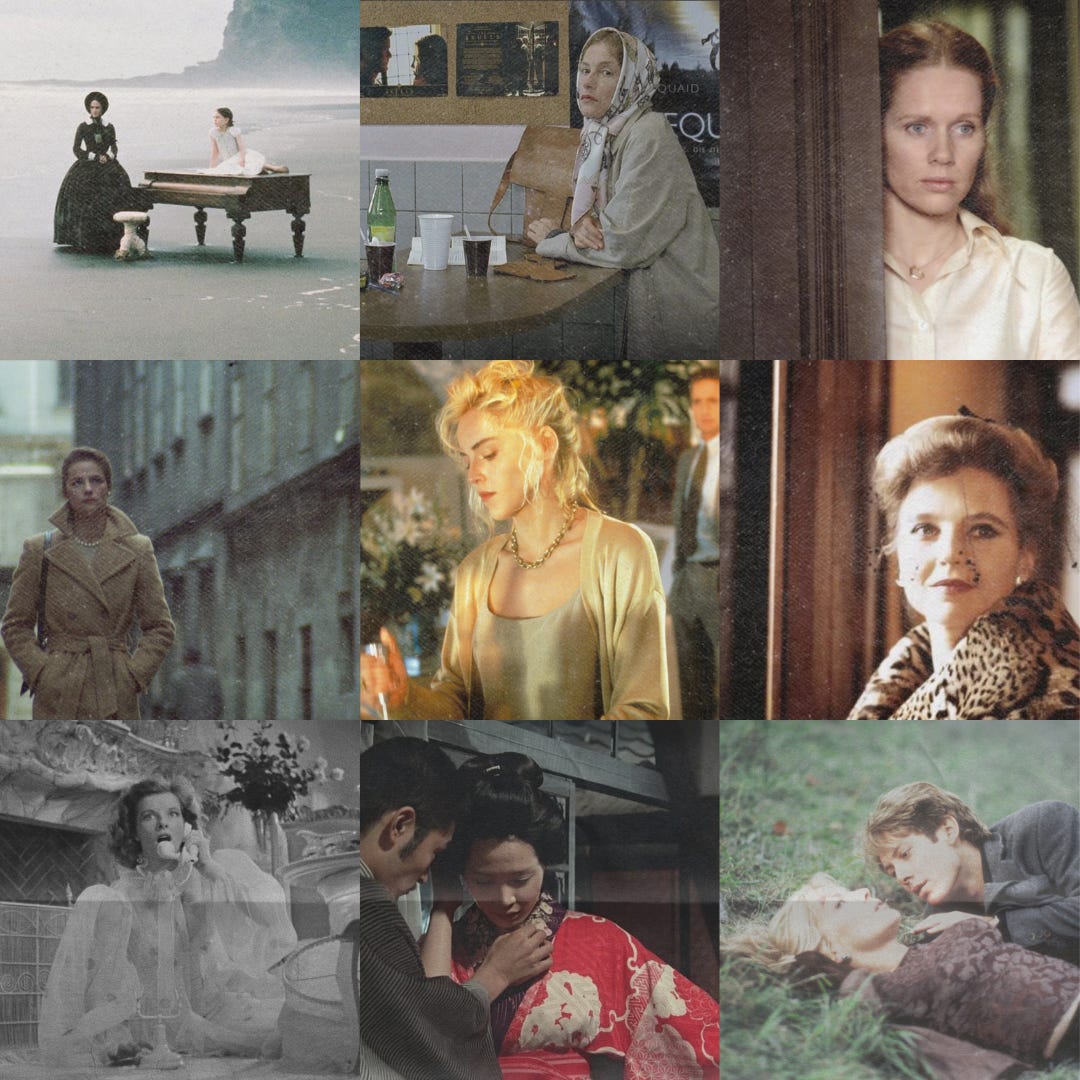
I once took a film class in which we watched several tortured movies about love. One day at my dorm we had a fire drill. Everyone filed out. I saw a girl who was in my film class, or maybe she saw me. We struck up a conversation. She told me that she hadn’t liked any of the movies we’d seen in class, that they were all so weird and strange. All of the characters were weird and strange. Who could possibly relate to them? Huh, I thought. That’s funny. You see, dear Reader, I am weird and strange. I could relate to them. And I loved those movies, every one.
Listed below are a couple of those movies, as well as some I have watched and loved since then. They all feature female characters who, yes, are a little weird and strange. They are also memorable, vital, passionate, larger than life. Whatever “representation” is, they are doing it for me. And I am grateful.
Ada McGrath, The Piano (1993)
Jane Campion decided to outwardly manifest the repressed Victorian lady I really, truly am on the inside in the form of Ada McGrath, a woman who does not speak except by means of her beloved piano. Her piano is not only her voice, not only her passion, not only the conduit to her deepest feelings and her inner life, it is her very self. Without it, she is lost, adrift, at sea, drowned.
Sent, with her young daughter, from Scotland to New Zealand in order to marry a frontiersman, she finds freedom, love, and finally happiness with his friend George Baines, a wild former sailor who has taken on Maori ways. Beneath the surface of her silence struggles a creature of intense vitality and yearning. Women were not permitted to want things in those days, but she wants her art, and she wants love.
Campion has stated that she regrets giving Ada a happy ending with both Baines and her piano. But the cliché that a woman must choose between work and a partner, between individual self-fulfillment and transcendence of the self through love, is so tired and so trite. To believe in this dichotomy would have rendered Ada forever speechless at the bottom of the sea. Instead she chooses life, and she begins to speak.
Erika Kohut, The Piano Teacher (2001)
Erika is Ada transported 100+ years into the future and transfigured into a Viennese piano teacher. Erika’s severity, however, masks something far darker. Middle-aged and unmarried, she lives alone with her mother; their relationship is fraught with tension, for the mother is domineering and the daughter is stuck, almost, in a kind of prolonged childhood, which makes her bitter. She seems to find an escape out of her narrow confines when engineering student Walter comes along, seeking piano lessons from her. His handsomeness and confidence, his popularity and charm, are at odds with her outer coldness and reserve, her strictness, her tight-lipped stare. In spite of herself, she is fascinated. But for Erika, love is a profound place of hurt, a site of punishment and restraint and violence and cruelty. She’s a woman who “asks for it,” and then she knows the ultimate horror of getting what one wants.
Dr. Jenny Isaksson, Face to Face (1976)
Liv Ullmann gives the performance of a lifetime here as a psychiatrist who, ironically, begins to suffer from mental illness herself. In taking care of a patient, something terrible happens; understandably, Jenny has a breakdown. Dreams and memories crowd upon her, vague shapes of the people she knows or has known, fears and anxieties. Scenes appear in which she screams at her dead parents, then seeks their comfort, then pushes them away again. Her husband comes in glibly, tells her to “take care of herself,” then leaves. Her daughter feels like her mother hates her. What is the way out of this mess? In a world of so much confusion and so much suffering (who could fail to have a mental breakdown in such a world?), what is there to redeem us? What can we hold onto in this void? Jenny sees the love between her caretaker grandmother and ailing grandfather and knows the answer: “I stood at the door for a long time looking at the old couple and their closeness. I watched their slow movements… I saw their dignity, their humility. For a short moment, I realized that love surrounds even death.” This realization saves her. Afterwards, Jenny calls the hospital and informs them that she’ll come into work the next morning. Her life will resume.
Lucia, The Night Porter (1974)
Sometimes love is like bonding with your Nazi tormenter in a concentration camp, sometimes it’s like hiding out in his apartment years later, chained to a table, rationing, digging out the last of blood-red jam from the jar with your fingers, wearing each other’s worn-out sweaters, until remaining inside becomes an impossibility, you put on your costumes of old, your little-girl dress, you walk down the street arm in arm and into the night, and you’re shot to death.
Catherine Tramell, Basic Instinct (1992)
Let me preface this one by saying that I am not a murderer. I don’t want to kill anybody. I don’t even own an ice pick. But I would love to have a house by the beach and do nothing all day but write novels and then confuse men with said novels. I would love to look that good in a 90s minimalist white dress. I would love to have that much poise and confidence in a room full of men trying to intimidate me. I would love to cooly ace a lie detector test, lying all the way. So maybe this one is not so much relatable as aspirational. Catherine Tramell is who I think I’d be had I been born rich, in San Francisco, and with Sharon Stone’s face. Which is to say, not me at all.
For the record, I do have to admit I think this movie is a rather poor Hitchcock knock-off. Just watch Vertigo. But everyone talks about how women should break into male-dominated fields, shatter glass ceilings, etc., etc. They should become presidents and CEOs, they should lead board meetings, they should be in STEM and TWIG and LEAF.1 What I want to know is, where are all the women psychos? If we’re pushing for equality, why cherry-pick? Therefore, Catherine Tramell, I say, keep doing the Lord’s work. The feminists will thank you one day.
Maria Braun, The Marriage of Maria Braun (1978)
Every once in a while, a version of me comes boiling up through the layers of self, a creature of driving, relentless ambition, gritted-teeth survivalism, and anything-it-takes pragmatism. The sight of this monster terrifies me; I shove her back in the bog whence she came immediately. Maria Braun does not. I admire her because she does not.
Maria Braun is a film bookended by two explosions: the first sees the wedding of a young couple; the second sees husband and wife reunited. Between these are strewn the rubble of the couple’s separation during WWII, then further separation during his time in jail. She kills for him; he falsely confesses for her. As the world falls down around her, she uses everything she has—lipstick and shorter skirt lengths, wit, charm, cleverness, energy, personality, sheer willpower—to defy the wreckage of war and its aftermath. Her rise is inevitable—as is her fall.
Susan Vance, Bringing Up Baby (1938)
Susan Vance is the unhinged of comedy, not the unhinged of tragedy. Her flaws and faults draw out laughs from us, not tears of commiseration or gasps of horror or grimaces of revulsion. She is the human embodiment of chaos. “Chaos is what killed the dinosaurs, darling,” J. D. tells Veronica in Heathers. Well, I’m no paleontologist, so maybe. But I think chaos is simply another name for good old-fashioned fun. Chaos is life swinging her feet, barely suppressing her giggles. Chaos is the beginning of the universe, ultra-hot particles bumping into one another. Chaos is what causes Katherine Hepburn to bump into the ultra-hot particle Cary Grant. And keep bumping into him, again and again. Nobody tells you how effective annoyance is as a seduction tactic. Exasperate a man, then use your cuteness to win his forgiveness. It’ll have you clinging to his hand as you dangle from scaffolding, the wreckage of his life’s work scattered 15-20 feet below you, in no time.
Sada Abe, In the Realm of the Senses (1976)
Sada Abe is just a little bit obsessive. She’s just a little bit clingy. She has just a little bit of a hard time letting go. She’s like if my anxious attachment were cranked up to 11. Her lust—I was going to say “for life,” but we’ll just leave it at that—is inextinguishable. For her, love is consumption, a total merging of two beings, a submerging of each in the other, or at least him in her. She wants a part of her lover to be with her at all times. Inside of her. Even if violently separated from his own body. Okay, so what? We all go to extremes every once in a while. Leave the mean to Aristotle and other boring men. After all, it’s “mean,” not “womean.”
Catherine Ballard, Crash (1996)
I, too, would get into multiple car accidents for 90s James Spader.
3 Things I’m in Love With This Week:
A Canterbury Tale (1944)—“You have to dig to find out about people as well as roads.” A British soldier, an American soldier, and a British “Land Girl” meet in a small town near Canterbury in the midst of WWII. For all three, Canterbury is a pilgrimage. For all three, a miracle awaits there. When Bach plays on the organ of Canterbury Cathedral and light shines in through the big stained glass window, I get chills.
“Go High” by Gisela Williams in Travel + Leisure—I came across this article in the July 2024 issue and was immediately struck by the beautiful pictures. I really liked learning about the Sherpa people of Nepal, their relationship to Mount Everest, and the story of Pasang Lhamu Sherpa, the first recorded Sherpa woman to reach Everest’s peak. Speaking of Powell and Pressburger (the directors of A Canterbury Tale mentioned above), this article reminded me of Black Narcissus, their 1947 drama of repression and the end of empire set in a beautifully painted Himalayas.


“The Man Who Could Paint Loneliness” by Zachary Fine in the New Yorker—This article is about the painter Caspar David Friedrich, or more specifically the retrospective of his work at the Alte Nationalgalerie in Berlin 250 years after his birth. The question Fine tries to answer here is “How did a man who painted foggy mountains and sunsets become the greatest German painter of the nineteenth century?” The answer, of course, lies in the work itself.
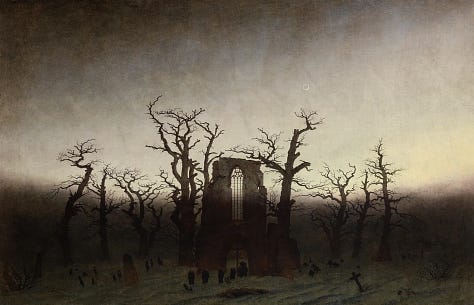

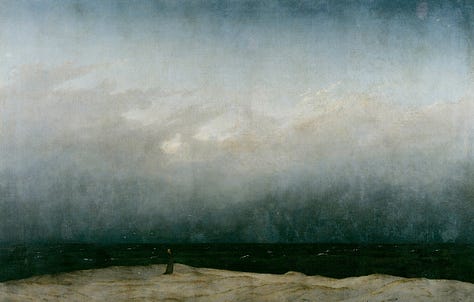
Words of Wisdom
“The end crowns all….”
—William Shakespeare, Troilus and Cressida
We do not know the arc of something, whether it has been good or bad, positive or negative, uplifting or destroying, until we reach the end of it. The end is the lens through which we look upon past events and see them in the light of truth. If the end is bitter, we feel that the beginning and middle have also been bitter; if the end is beautiful, then we disregard any niggling negatives from earlier and reframe them as mere blips or mistakes, “nobody’s perfect,” inevitable accidents. To end something with dignity is simply part and parcel of an honorable character. Now we live in an age where people can be tossed out like trash, thrown to the wind, picked up one moment and disregarded the next. Why have we reached this deplorable state in which everyone is a means to an end? What is this moral void, in which concern for another’s feelings, another’s inner life, another’s future, another’s hopes and dreams, another’s illusions, another’s belief in truth, another’s very innocence and purity, warrants not even a millisecond of consideration? Few people know what love is anymore, fewer still what it means to have basic human decency. I long for a world in which the evil visited upon pure-hearted persons redounds upon its perpetrators a thousandfold—but only God knows all, and only God knows what lingers in the hearts of each of us. If “the end crowns all,” God give me the strength to write my own happy end—God give me the strength.
Poetry Corner
One Art
The art of losing isn't hard to master; so many things seem filled with the intent to be lost that their loss is no disaster. Lose something every day. Accept the fluster of lost door keys, the hour badly spent. The art of losing isn't hard to master. Then practice losing farther, losing faster: places, and names, and where it was you meant to travel. None of these will bring disaster. I lost my mother's watch. And look! my last, or next-to-last, of three loved houses went. The art of losing isn't hard to master. I lost two cities, lovely ones. And, vaster, some realms I owned, two rivers, a continent. I miss them, but it wasn't a disaster. —Even losing you (the joking voice, a gesture I love) I shan't have lied. It's evident the art of losing's not too hard to master though it may look like (Write it!) like disaster.
—Elizabeth Bishop
The best villanelle.
Beauty Tip
Take deep breaths and remember that you are capable of enduring far worse. You will make it out to the other side, and you will be happy.
Lingering Question
What is one way in which you can bring a sense of optimism to something that has impacted you negatively?
—
Dear Readers, thank you for reading! I hope you enjoyed this one—the format is slightly different from previous weeks, but let me know if you’d like me to do more of these series of 9 things in the comments, and as always, don’t forget to leave a like and subscribe to Soul-Making!
I made these last two up.





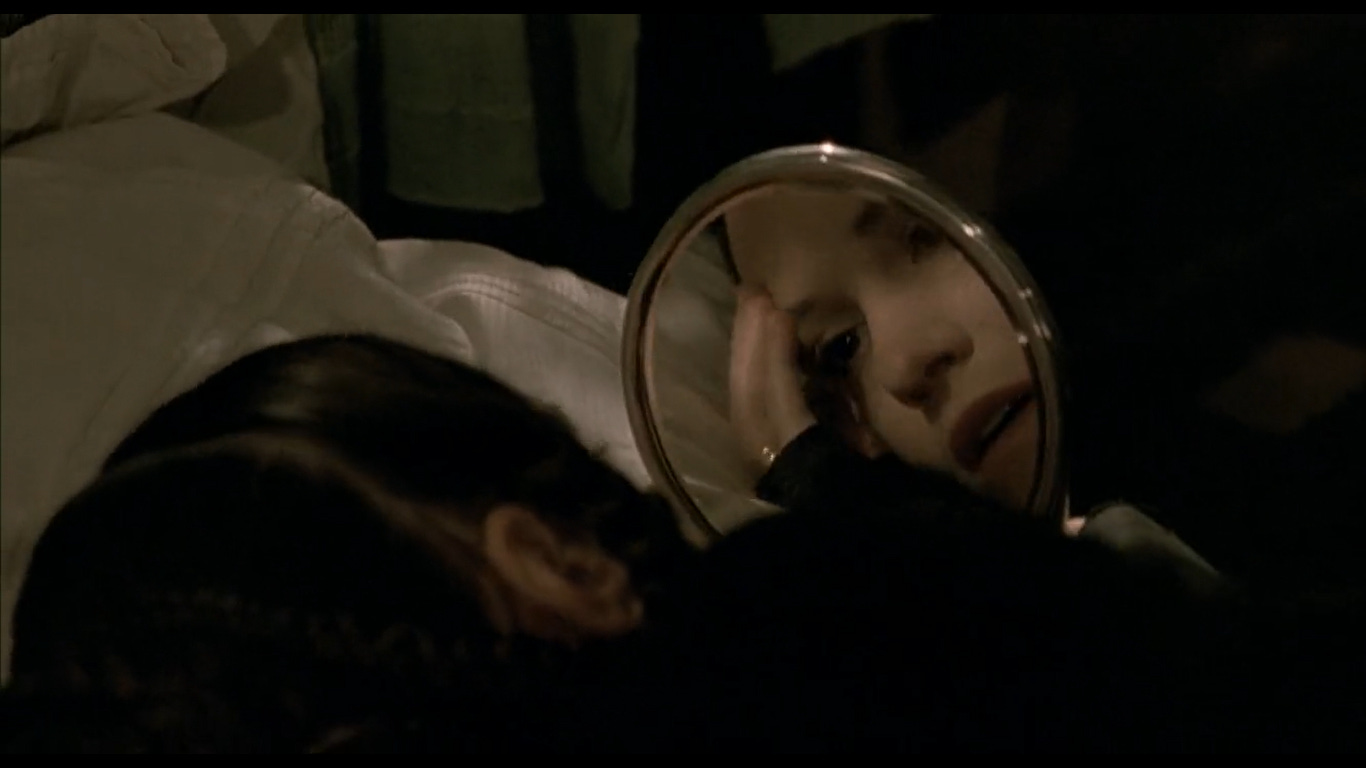
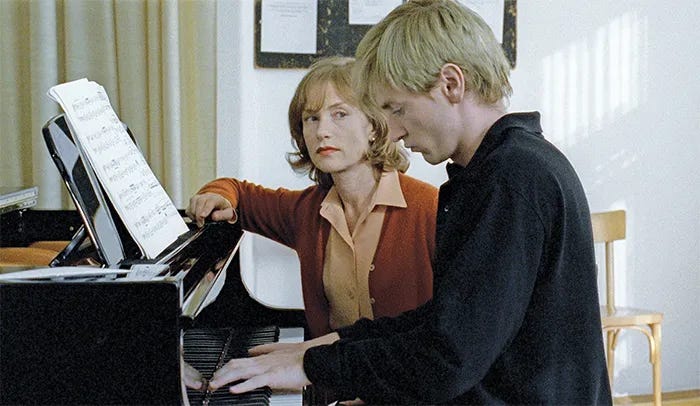
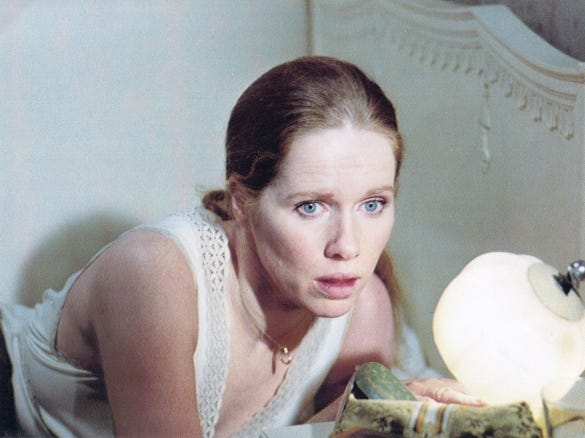
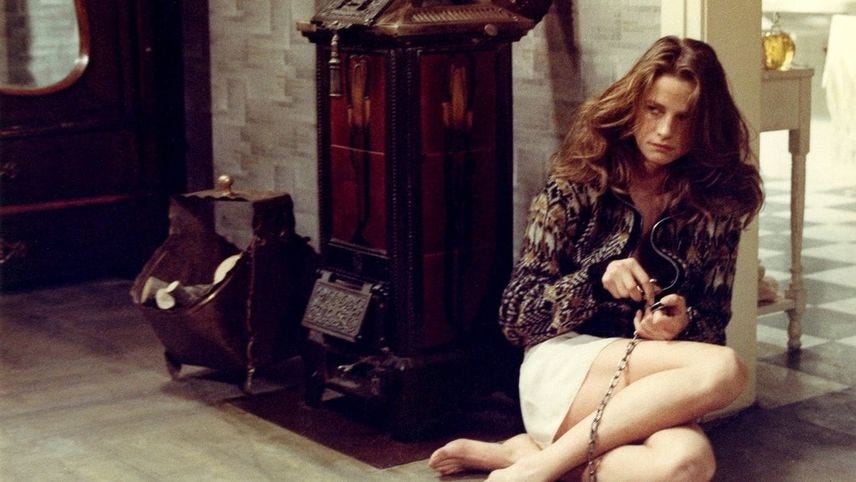
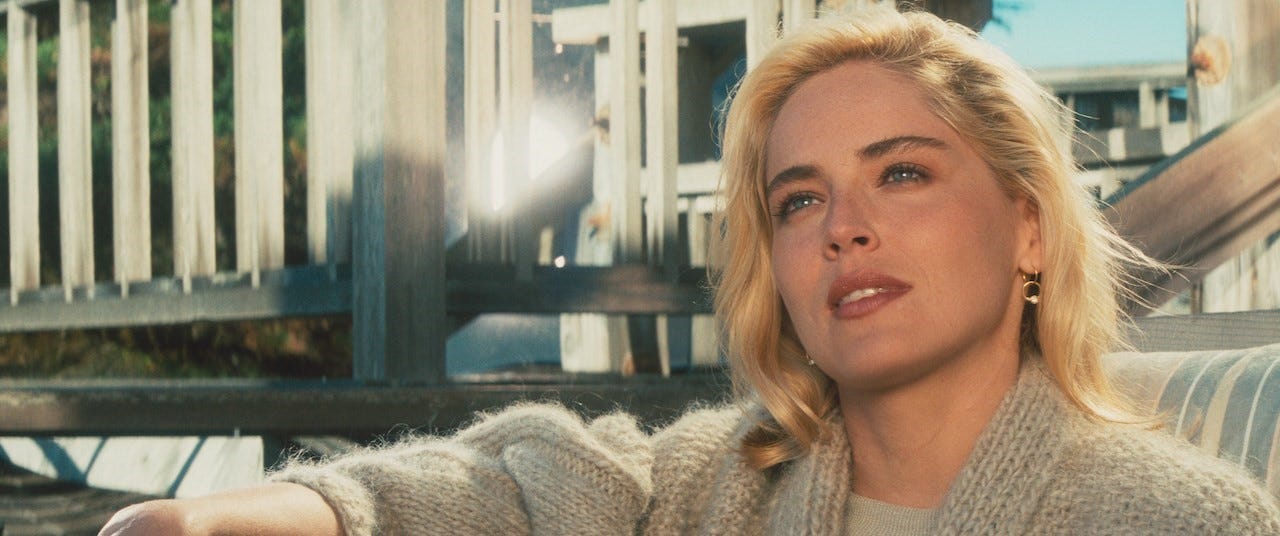
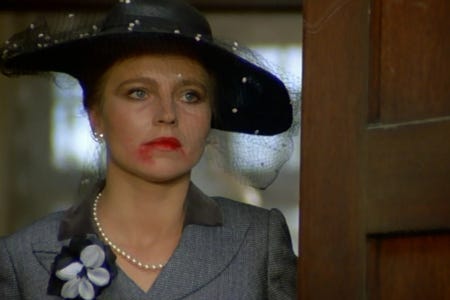
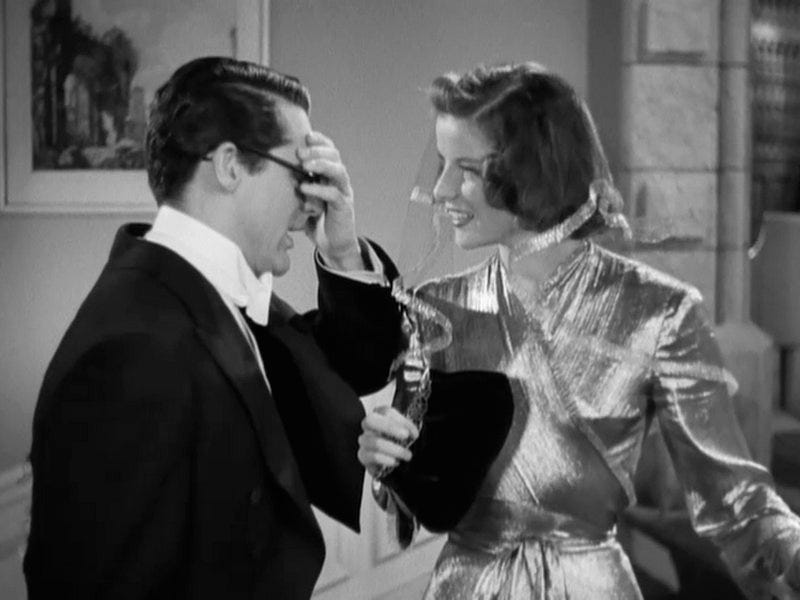
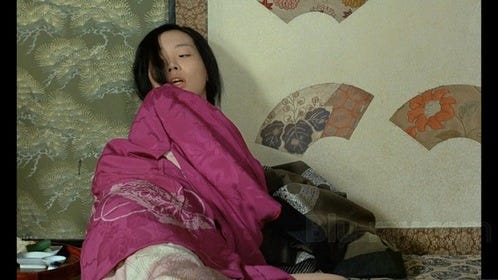

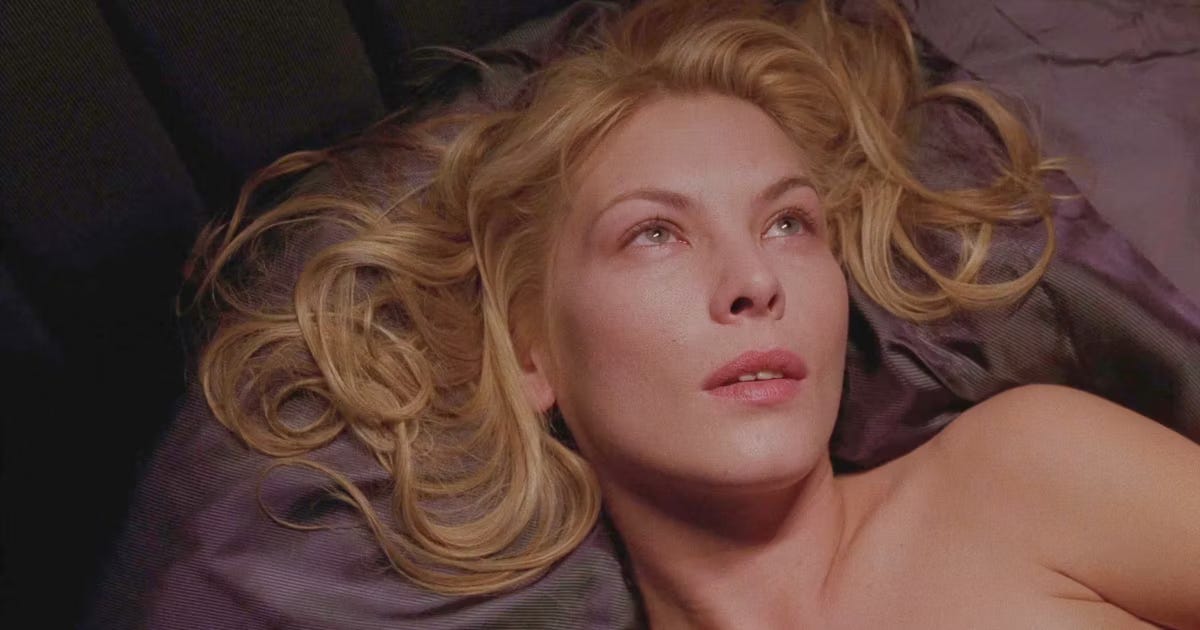
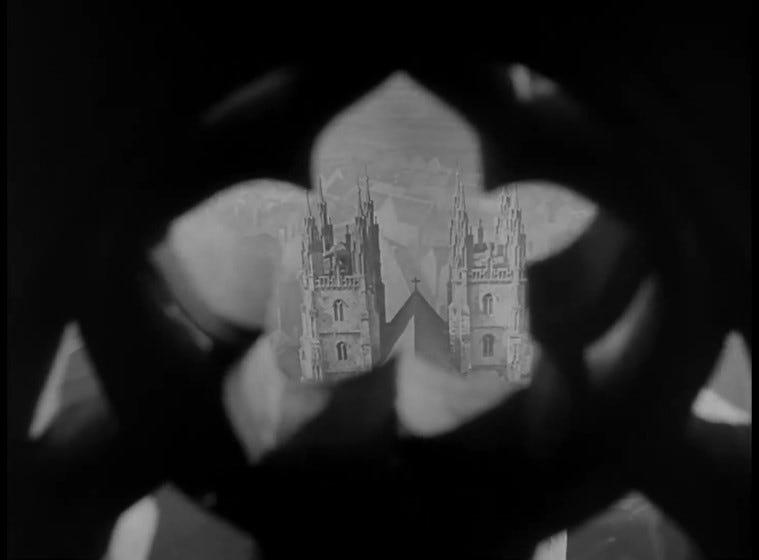
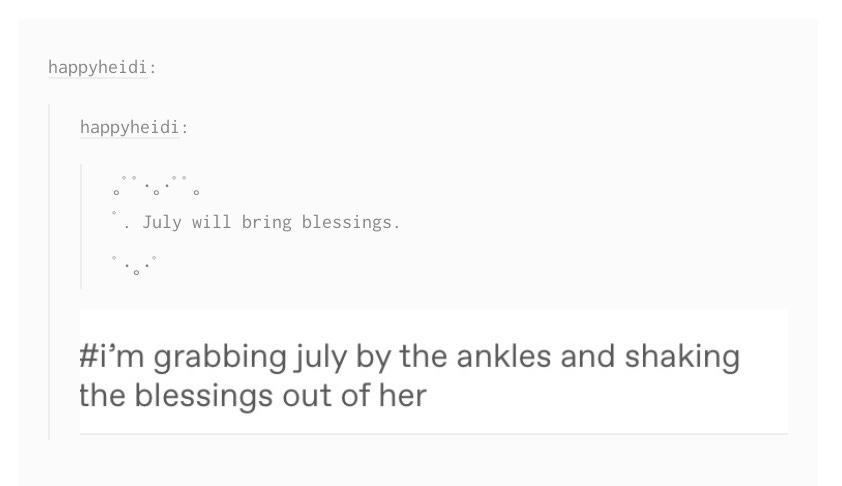
Your writing on women is so well said!
I love your elaboration on Shakespeare’s quote 😊. You are a crafty writer and I can’t wait for your next week’s Friday frivolity.
This writing is so beautiful. You are a very good writer. Keep writing! You have so many lists pf good movies!